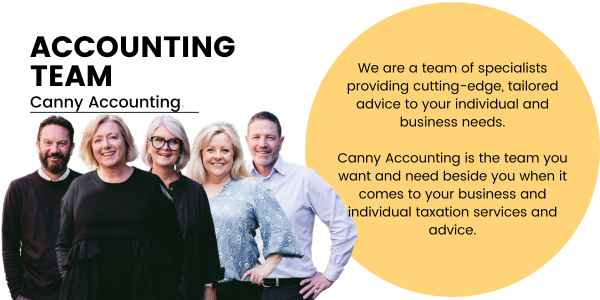Setting Up a Business: An (Accounting) Checklist
Written by: Accounting Team
If you have already thought up your business idea and are now ready to start your own business, then there are a number of steps involved before you are ready to start trading.
The checklist below highlights some of the more important steps involved in getting your business started.
At Canny Accounting, we’re here to help you get your business up and running!
Choose a Business Structure
When starting a business you must decide on a business structure. The structure you choose identifies how you operate as a trading business and can affect your tax obligations.
The right legal structure for your business should be determined after considering your aspects including:
- Tax Effectiveness: keeping your tax expense down and staying within the law;
- Asset Protection: protecting your personal and business assets as much as possible from creditors and other litigants in the event things do not go as planned; and
- Business Efficiency: you will need to operate efficiently in your day-to-day transactions while providing the security your venture requires.
The most common business structures to select from are:
Sole Trader
This is the simplest structure available which gives you total control of your business assets & decisions and you keep all the profits.
There are minimal set-up costs and it’s very easy to establish and operate. One significant downside of this structure is that you are personally liable for all debts of the business. Also, your capacity to obtain finance may be limited.
Thinking that it might be time to change from a Sole Trader to A Company? Check out this blog we previously put together: Time To Change From A Sole Trader To A Company.
Company
This is a more complex structure.
It limits your personal liability as companies are considered a separate legal entity, meaning it provides some important protection for those running the business. There are also tax and other advantages with this structure. On the downside, this is a more complex and expensive business structure to set up and maintain. Using a company structure means that the principals become employees of that company. This may give rise to payroll tax, WorkCover and compulsory superannuation.
Partnership
This structure is made up of two or more people running the business.
Partnerships are relatively easy and inexpensive to set up. Partnerships come with the advantage of having multiple people responsible for decision-making, additional knowledge and know-how. There is also less financial burden than a sole trader structure. Each partner, however, is jointly and severally personally liable for the debts of the partnership. Partnerships may also be difficult to leave. In some cases, you may need another partner to buy you out or your other partners to agree to another party joining the partnership.
Trust
In this instance a trustee (individual or company) holds the assets and runs the business, distributes income and follows provisions of the trust deed.
This structure provides flexibility in distributing income among beneficiaries. It can also provide limited liability and more privacy if a corporate trustee is appointed. Trust structures however can be complex and costly to set up and maintain. The powers of the trustee are detailed in the trust deed.
We can help you choose a business structure appropriate to your needs and can set up your structure.
Choose a Business Name
Choosing the right business name will help create the image you want for your business. It’ll also help to distinguish you from your competitors. A business name is the name your business trades under.
Once you’ve decided on a name, you will need to register the business name.
Select Your Business Premises
If you are running a home-based business, there are specific tax obligations you need to know.
If you will be running a separate business premises with a leasing agreement, it’s important to obtain legal advice before signing any lease. Choosing the right locations for your business can be vital to your success. Each business has different priorities and needs.
Business + Tax Registrations
You will need to register for the following (if applicable) depending on the structure of your business:
- Company and/or Trust set up;
- Partnership agreement;
- Tax File Number (TFN) application;
- Australian Business Number (ABN) application;
- Goods and Services Tax (GST) registration;
- Pay As You Go Withholding (PAYGW) registration;
- Fuel Tax Credits (if applicable);
- WorkCover (if employing); and
- Payroll Tax (if applicable).
It is important to know what other registrations you may need. You may need specific licenses and permits to get approval to do certain activities in your industry (if applicable).
Business Plan, Research + Marketing
Preparing a business plan can assist you with clarifying your business goals and objectives, and noting your operational plan (how you will achieve your goals). And can also assist when applying for finance.
Researching your market will give you an understanding of who your customers are and what needs they have. It can also help you identify your competitors. Based on your market research you will be better informed to make decisions on your business marketing, including who and where to target.
Any marketing your business undertakes should include a digital presence including social media. This may include setting up a website for your business, using social media to promote your business, connect with customers and create an avenue to sell your product or service online.
When you start a business, there are many laws your business may need to comply with. Your research should also include understanding what legal requirements will apply to your business. Legal requirements other than those already discussed can include things like fair trading, contracts, privacy, franchising, importing and exporting, environmental considerations, intellectual property and terms & conditions.
Arrange Finances + Bank Accounts
You will need to open an appropriate bank account. You may also need to open other bank accounts, including credit/debit cards. If you will accept card payments, then you will also need to arrange suitable merchant facilities.
Your business may require finance, and you should ensure appropriate finance arrangements are in place.
You should also consider your estimated cash flow. A cash flow budget helps if you identify the estimated money coming in and out of your business and will assist in planning ahead.
You should also have a good understanding of your business tax obligations and factor these into your cash flow forecasts. Some of the taxes your business will pay include income tax, goods and services tax (GST), fringe benefits tax (FBT), Pay As You Go Withholding (PAYG) and Payroll Tax as applicable.
We can help you develop your cash flow budget and finance requirements.
Insurances + WorkCover
Choosing the right insurance policies to protect your business, customers and your income is a necessary step for all businesses. What insurance you will need depends on your business and industry.
The two common compulsory insurance required for Australian businesses include:
- Workers’ compensation insurance if you have employees; and
- Public Liability insurance is compulsory for certain types of businesses.
Other optional business insurances you should consider include:
- Business property insurance – covering physical assets of a business;
- Business interruption insurance – covering for loss of income during interruption to your business due to insurable events;
- Professional indemnity insurance – protects professionals who provide advice or services to clients;
- Motor vehicle insurance – for all business vehicles;
- Personal income protection insurance – can be important for self-employed and small business owners as you may not have any sick/annual leave entitlement. Also, you may have dependents or financial commitments that rely on your income; and
- Other insurances as required.
Employ Staff/Hire Contractors
If your business will employ staff or engage the services of contractors, then there are obligations your business will have to prepare for.
You may need to treat your contractors differently from your employees for tax and superannuation purposes. Some contractors may be treated like employees under the law and may be eligible for super guarantee payments.
When employing, businesses will have tax and superannuation obligations, including Single Touch Payroll reporting. Obligations include:
- Having the relevant paperwork – employment contracts, Fair Work Information Statement, Tax File Number declarations, employee details including super fund and bank account details, and other paperwork as required;
- Registering for PAYG withholding (as mentioned above);
- Arrange to report & pay super guarantee to employee’s super fund by the required dates;
- Take out WorkCover insurance – as discussed above; and
- Set up your Payroll software – this will assist you in keeping and maintaining employment records including pay, hours worked, leave entitlement, tax, and super and to comply with Single Touch Payroll (STP) reporting requirements.
Want to know more about setting up a business and your legal requirements? Check out this previous blog we put together: Setting Up A Business: A (Legal) Checklist.
Arrange Software + Record Keeping
Keeping good records can help you understand how your business is going, manage your cash flow and meet your tax and superannuation obligations.
Record keeping can be done manually as hard copies, however, the Australian Tax Office (ATO) recommends electronic record keeping, if possible. There are many business booking or accounting software options that can make record-keeping easier.
Your business should have your business bookkeeping software ready for the commencement of business. If you do not have the expertise or time to maintain your bookkeeping and record-keeping requirements, then you should consider the services of a bookkeeper.
There are legal requirements for businesses to keep records securely. Generally, you must keep your tax and superannuation records for a minimum of 5 years. This includes records of all transactions of your business included in your tax returns & reports. There is a longer 7-year period to keep all employee records, although to track employee entitlements, you should retail relevant records for all current employees.
You should store your records in a secure place and keep them backed up in case of a computer failure.
Thinking about how your currently organising your bookkeeping and how to get it organised? Check out this previous blog we put together: Getting Your Bookkeeping In Order For Each. Quarter
Already Running Your Own Business?
If you are currently running your own business it may be a good time to check and see which, if any, of the checklist points in this article may apply to your business.
These can include such things as:
- Business structure – is it time for your growing business to change from a sole trader to a company or trust structure. This could be for tax or operational considerations;
- Registrations – Do you need to update or cancel any of your registrations if there have been or will be changes in your business operations. A couple of examples may include you will start employing staff and will need to register for PAYG withholding or your business turnover will reach $75,000 in which case you will need to register for GST; and
- Insurances – insurances should be reviewed at least every year to see if your insurance cover is sufficient for your current business operations.
Canny Accounting + Expert Business Advice
Canny Accounting is here to help you with the setup of your new business venture. We can provide assistance and guidance through all the steps involved in establishing your business and getting it set up and ready for a successful and prosperous journey.
Get in touch with our team to find out how we can help you on your business journey, no matter where you are!





